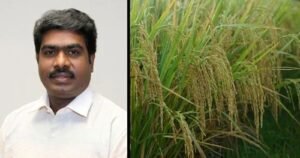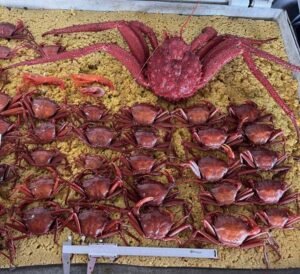Thursday, 5 March 2026
Bugs on menu: Singapore embraces edible insects for sustainable future
The growing interest in insect-based food comes after the Singapore Food Agency (SFA) approved 16 species of edible insects for sale and consumption in July Singapore-based Insect Food, under its…

The growing interest in insect-based food comes after the Singapore Food Agency (SFA) approved 16 species of edible insects for sale and consumption in July
Singapore-based Insect Food, under its brand Insectyumz, has introduced Tom Yum-flavored crickets, expanding its lineup of insect-based food products. In addition to crickets, Insect Food offers mealworms, silkworms, locusts, white grubs, and honeybees. Meanwhile, another company, Altimate Nutrition, recently entered the market with its Cricket Protein Bars.
The growing interest in insect-based food follows the Singapore Food Agency (SFA)’s approval of 16 edible insect species for sale and consumption in July last year. To ensure food safety, the SFA has established a regulatory framework outlining guidelines for farming, processing, and importing edible insects. This move aligns with a global trend promoting insects as a sustainable, high-protein alternative to traditional livestock, contributing to methane emissions.
A growing market
According to a ResearchAndMarkets.com report, the global insect protein market was valued at $1.01 billion in 2023. With rising demand for sustainable and protein-rich food alternatives, the market is projected to grow at a compound annual growth rate (CAGR) of 16 per cent, reaching $4.09 billion by 2032.
SFA-approved edible insects
The following insect species have been approved for human consumption in Singapore:
House cricket – A common household cricket with long antennae and large hind legs.
African migratory locust – A subspecies of locust known for forming large swarms.
White grub – The larval stage of various beetle species.
Greater wax moth, giant rhino beetle grub, silk moth/silkworm, lesser mealworm, superworm, grasshopper, locust beetle grubs, and honeybees – All approved for human consumption.
The SFA began public consultations on insect-based food regulation in late 2022. While the agency initially planned to approve 16 species by mid-2023, the final decision was delayed.
Regulatory framework for insect-based food
To ensure food safety, the SFA’s regulations are based on the following key principles:
Only insect species with a history of human consumption can be approved.
Farming and processing methods must prevent contamination.
Final products must meet food safety standards.
These guidelines were developed through a scientific review referencing policies from the European Union, Australia, New Zealand, South Korea, and Thailand. However, no international standards from the Codex Alimentarius Commission or the World Organisation for Animal Health on insect-based food products exist.
Singapore’s emerging insect food industry
The insect food sector in Singapore is still in its early stages, with only a few companies entering the market:
Insect Food – Offers a variety of insect-based products, including crickets, mealworms, silkworms, locusts, white grubs, and honeybees. The company launched Insectyumz in July 2024, shortly after SFA’s approval.
Altimate Nutrition – Specialises in cricket-based protein bars.
Morus – A university-backed startup focusing on the nutritional potential of silkworms. The Japanese company produces silkworm-based products for high-end restaurants and health-conscious consumers.
Potential allergy risks
Researchers from James Cook University warn that edible insect proteins may trigger allergic reactions, especially in individuals with existing shellfish allergies.
Professor Andreas Lopata and Dr Shay Karnaneedi from the Australian Institute of Tropical Health and Medicine explain that crickets and flies are closely related to crustaceans like prawns, crabs, and lobsters. As crustacean allergies affect up to 4% of the population, those individuals may also react to insect-based foods.
“The trouble is that insects are closely related to crustaceans. People allergic to prawns, crabs, or lobsters could experience reactions after consuming insect proteins,” said Professor Lopata.
A sustainable future for insect-based food
With increasing environmental concerns and a push for sustainable food sources, Singapore’s adoption of edible insects marks a significant step toward alternative protein solutions. The SFA’s regulatory framework ensures food safety while fostering innovation in the sector.
As global demand for sustainable protein grows, Singapore is positioning itself as a leader in the edible insect industry, offering consumers an eco-friendly and nutritious way to meet their dietary needs.
Shraddha Warde
shraddha.warde@mmactiv.com
Technology
Copeland Launches ZF/ZFI 10-20HP Scroll Compressors
Mar 05, 2026 | Company News
WA Scientists Discover New Deep-Sea Crustacean Stocks with Strong Commercial Potential
Mar 05, 2026 | Australia
Food Testing
NSF and Circle H Collaborate to Enable Global Certification Access
Mar 04, 2026 | Company News
Australian Medical Bodies Push for Compulsory Health Star Labelling
Feb 24, 2026 | Australia
Tim Hortons Singapore Secures Majlis Ugama Islam Singapura Halal Certification Ahead of Ramadan
Feb 23, 2026 | Company News
More Popular
Copeland Launches ZF/ZFI 10-20HP Scroll Compressors
Mar 05, 2026 | Company News
Singapore Expands Support for Local Farms to Strengthen Food Security
Mar 05, 2026 | Food Security






